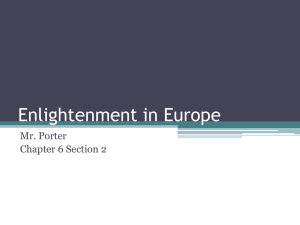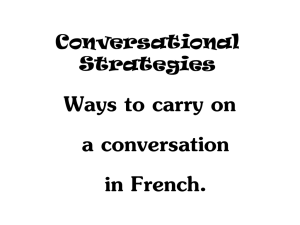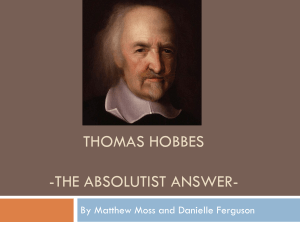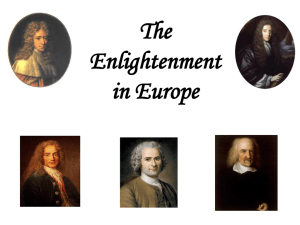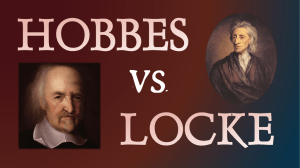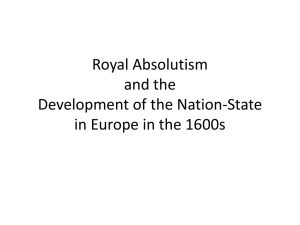hobbes_fr
advertisement
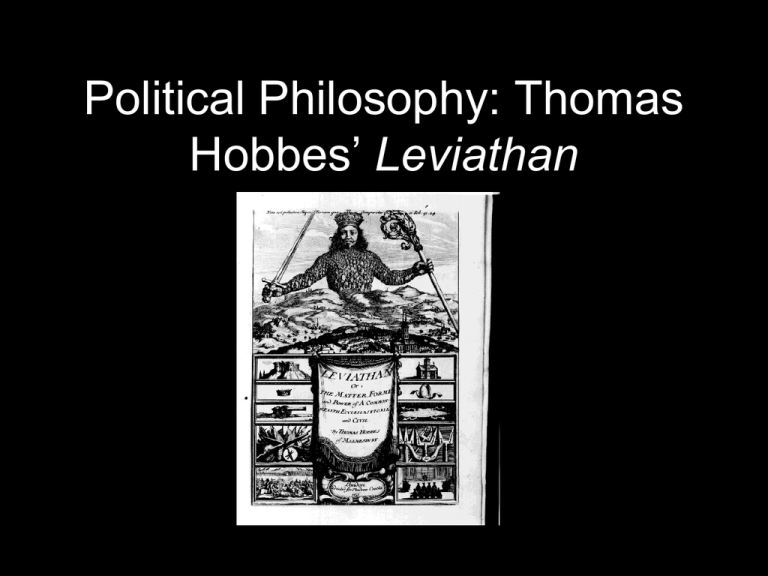
Political Philosophy: Thomas Hobbes’ Leviathan Thomas Hobbes: His Context Thomas Hobbes was born in Malmsbury, England, in 1588. As he noted in his autobiography, he was “born a twin of fear” because his mother went into premature labor out of fear that the Spanish Armada was about to attack England. Hobbes lived through a tumultuous period in English history, and his most productive years as a philosopher coincided with a time of political turmoil and civil war. Early in the 1640s, when it became clear that Parliament was going to turn on King Charles I, Hobbes fled to France. As a devoted monarchist, Hobbes feared persecution if he stayed in an England run by Parliamentarians. Excerpts from Leviathan The following is an interactive exploration of Hobbes’ philosophy. Please stand up! During the presentation, read through the excerpt from Leviathan and then remain standing if you agree with the statement in question. Let us begin… (1561) Theme: Human Equality Excerpt: “….the difference between man and man, is not so considerable, as that one man can thereupon claim to himself any benefit, to which another may not pretend, as well as he. For as to the strength of the body, the weakest has strength enough to kill the strongest, either by secret machination, or by confederacy with others, that are in the same danger with himself.” La question : Croyez-vous qu’en général tout le monde a la même capacité de faire mal `a autrui? Si oui, restez debout. Sinon, asseyez-vous et écrivez au moins un paragraphe qui explique votre raisonnement. Theme: Human Nature Desire Excerpt: “From this equality of ability, ariseth equality of hope in the attaining of our ends. And therefore if any two men desire the same thing, which nevertheless they cannot both enjoy, they become enemies; and in the way to their end, which is principally their own conservation, and sometimes their delectation only, endeavor to destroy or subdue one another. And from hence come to pass, that where an invader hath no more to fear than another man’s single power; if one plant, sow, build, or possesses a convenient seat, others may probably be expected to come prepared with forces united, to dispossess and deprive him, not only of the fruit of his labour, but also of his life or liberty. And the invader again is in the like danger of another.” La question : Dans un état naturel, est-il toujours possible pour un homme (ou un groupe d’hommes de conspires de voler les fruits du travail d’autrui? Si oui, restez debout. Sinon, asseyez-vous et écrivez au moins un paragraphe qui explique votre raisonnement. Theme: Causes for Conflict Excerpt: “So that in the nature of man, we find three principle causes of quarrel. First, competition; secondly, diffidence; thirdly, glory. The first, maketh men invade for gain; the second, for safety; and the third, for reputation. The first use of violence, to make themselves masters of other men’s persons, wives, children, and cattle; the second to defend them; the third, for trifles, as a word, a smile, a different opinion, and any other sign of undervalue, either direct in their persons, or by reflection in their kindred, their friends, their nation, their profession, or their name. Hereby it is manifest, that during the time men live without a common power to keep them all in awe, they are in that condition which is called war, as is of every man, against every man.” Les questions : Croyez-vous que la cause principale du conflit et soit l’espoir du gain, de la sécuriité, soit la poursuite de la gloire? Si oui, restez debout. Sinon, asseyez-vous et écrivez au moins un paragraphe qui explique votre raisonnement Croyez-vous que sans un pouvoir puissant qui tient “men in awe” les gens se batteront les uns contre les autres pour le gain, la sécuritéeou la gloire? Si oui, restez debout. Sinon, asseyez-vous et écrivez au moins un paragraphe qui explique votre raisonnement Theme: The “State of War” Excerpt: “Whatsoever therefore is consequent to a time of war, where every man is enemy to every man, the same is consequent to the time wherein men live without other security than what their own strength and their own invention shall furnish them withal. In such condition there is no place for industry, because the fruit thereof is uncertain, and consequently no culture of the earth; no navigation, nor use of the commodities that may be imported by sea; no commodious building; no instruments of moving and removing such things as require much force; no knowledge of the face of the earth; no account of time; no arts; no letters; no society; and, which is worst of all, continual fear and danger of violent death; and the life of man, solitary, poor, nasty, brutish, and short.” Les questions : Dans un état naturel, l’homme est-il essentiellement dans un “état de guerre” comme le décrit Hobbes? Si oui, restez debout. Sinon, asseyez-vous et écrivez au moins un paragraphe qui explique votre raisonnement. Dans un état naturel/de la guerre, l’homme est-il damné à une existence qui est “solitary, poor, nasty, brutish, and short” et dans laquelle il ne peut pas jouir des fruits de son travail? Si oui, restez debout. Sinon, asseyez-vous et écrivez au moins un paragraphe qui explique votre raisonnement. Theme: The Relation of Law and Power Excerpt: “To this war of every man against every man, this also is consequent; that nothing can be unjust. The notions of right and wrong, justice and injustice, have there no place. Where there is no common power, there is no law; where no law, no injustice. Force and fraud, are in war the two cardinal virtues.” La question : Croyez-vous que la justice et l’injustice existent seulement où il existe une force capable de renforcer ces concepts? Si oui, restez debout. Sinon, asseyez-vous et écrivez au moins un paragraphe qui explique votre raisonnement. Theme: Agreements and Force Excerpt: “…covenants, without the sword, are but words, and of no strength to secure a man at all.” La question : Croyez-vous que les accords majeurs entre les gens ne seront pas respectés sans une force physique qui les soutiennent? Si oui, restez debout. Sinon, asseyez-vous et écrivez au moins un paragraphe qui explique votre raisonnement. Theme: The Necessity of Government Excerpt: “The only way to erect such a common power as may be able to defend them from invasion of foreigners, and the injuries of one another, and thereby to secure them in such sort, as that by their own industry, and by the fruits of the earth, they may nourish themselves and live contentedly, is, to confer all their power and strength upon one man, or upon one assembly of men, that may reduce all their wills, by plurality of voices, unto one will…” La question : Croyez-vous que la seule façon de «s’échapper» à cet état de guerre qui vient de l’état de nature est céder du pouvoir personnel à un plus grand pouvoir pour que la liberté et la sécurité des biens puisse être préservé? Si oui, restez debout. Sinon, asseyez-vous et écrivez au moins un paragraphe qui explique votre raisonnement Debrief: Hobbes’ Key Points If you remained standing, you agree with Hobbes’ major arguments for giving power over to a monarch. His reasoning is as follows: 1. People are generally equal in ability to harm one another. B. With equal ability to harm one another, people can and will harm one another to gain advantage over each other. III. People fight for gain, safety, and glory. *. In a state of nature, people are in a state of war – seeking material gain, safety and/or glory at the expense of others. E. In the “state of war” that human nature puts us in, we cannot enjoy the fruits of our labor because another person or group may conspire to seize what is ours. VI. In the “state of war” that human nature puts us in, there is no “right,” “wrong,” “justice,” and “injustice.” #. Agreements that are made without the force of arms do not hold. Ate. People must submit to an authority that keeps men in “awe.” This authority must have the force of arms. It is the only way people may enjoy life, liberty, and the fruit of their labor. Your evaluation of Hobbes: If you sat down, note which statement you disagreed with. Where did Hobbes “have it wrong”? In other words, what do you disagree with? Conclusion… Within Hobbes’ political philosophy one finds an interesting view of human nature. Ask yourself whether or not you agree with his view. What are your answers to the following questions: キ Without the awesome power of the state, are people without the ability to gain from their labor and enjoy peace? キ Is the only reason people feel compelled to follow law the fact that they fear the consequences?

